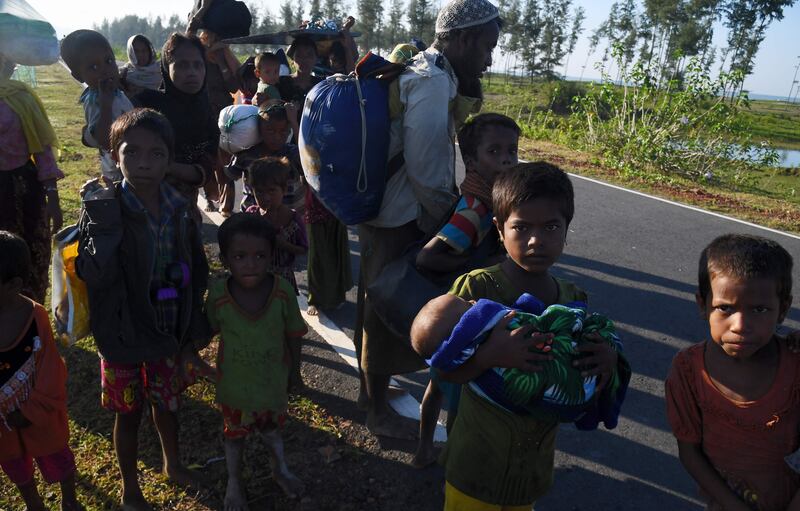Myanmar has warned the United Nations that a Security Council statement on the Rohingya refugee crisis could "seriously harm" its talks with Bangladesh over repatriating more than 600,000 people who have fled there to escape a military crackdown.
The Security Council on Monday urged Myanmar to "ensure no further excessive use of military force" and had expressed "grave concern over reports of human rights violations and abuses in Rakhine State".
In response, Myanmar's de facto leader Aung Sang Suu Kyi — whose civilian administration of less than two years shares power with the military - said the issues facing Myanmar and Bangladesh could only be resolved bilaterally, a point she says was ignored in the Security Council statement.
"Furthermore, the (Security Council) Presidential Statement could potentially and seriously harm the bilateral negotiations between the two countries which have been proceeding smoothly and expeditiously," she said in a statement released on Wednesday.
Negotiations with Bangladesh continue and the Bangladesh foreign minister Abul Hassan Mahmood Ali has been invited to Myanmar on November 16 and 17. However, Bangladeshi officials said the minister's visit was now likely to take place at a later date.
A sour note was struck over the talks last week over Ms Suu Kyi's spokesman, who suggested that Bangladesh might purposely drag out reaching an agreement on the repatriation process in order to first secure hundreds of millions of dollars in international aid money. The Bangladesh delegation was outraged.
Speaking at a conference for parliamentarians from Commonwealth countries in Dhaka on Sunday, the prime minister of Bangladesh, Sheikh Hasina, called for more international pressure on Myanmar.
"I would request all of you to discuss Rohingya issue with utmost priority and exert pressure on the Myanmar government to stop the persecution of its citizens and take them back at the earliest," she said.
The US secretary of state Rex Tillerson is due in Myanmar on November 15, with moves afoot in Washington to table a bill calling for sanctions on Myanmar that specifically target the military and related business interests.
In a nod to China, the Myanmar statement said it appreciated the stand taken by some members of the Security Council who upheld the principle of non-interference in the internal affairs of sovereign countries.
MORE BOATS REACH BANGLADESH
The UN has denounced the driving out of the Rohingya Muslims from predominantly Buddhist Myanmar during the past 10 weeks as a classic example of ethnic cleansing. The Myanmar military, however, insist its counter-insurgency clearance operation was provoked by Rohingya militants attacking 30 security posts in the northern part of Rakhine State in a synchronised operation on August 25.
Rohingya refugees say the military torched their villages, but the military it was Rohingya militants who set the fires. The refugees have given harrowing accounts of rape and murder. Myanmar says those accusations require investigation.
Meanwhile, the exodus from Rakhine continues. Several thousand Rohingya reached Bangladesh last week, many wading through the shallows of the Naf river on the border between the two countries, and some making a short but perilous sea crossing in small boats.
According to Bangladesh border guards at least two more boatloads have reached Cox's Bazar on Tuesday, bringing 68 more Rohingya to join the hundreds of thousands who have taken shelter in refugee camps there.
Aung San Suu Kyi, a stateswoman lionised as a Nobel Peace Prize winner for defying the junta that ruled Myanmar for decades, has been pilloried abroad for not speaking out more forcefully to rein in the military. Last week she went to Rakhine for the first time since the crisis erupted, and met with community leaders and saw the efforts being made to deliver aid and return the region to some semblance of normality.
She has spoken of plans to open repatriation processing centres, where the refugees will have to prove they were once resident in Rakhine before being allowed to return. But having been classed as stateless by the old military junta, passing the repatriation test will be difficult for the Rohingya.
During recent weeks, authorities have begun issuing "national verification cards" to people in northern Rakhine. Remaining Rohingya have been reluctant to accept these cards as they do not guarantee citizenship, and would effectively treat them as new immigrants.





